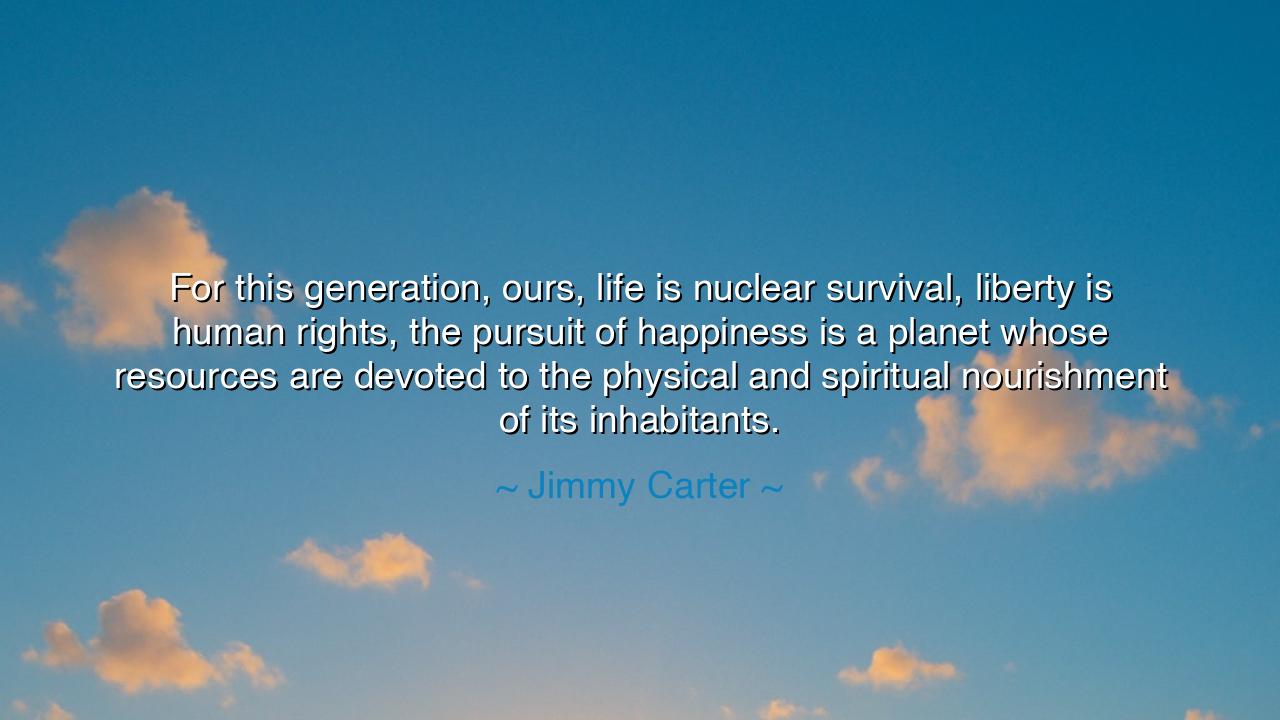
For this generation, ours, life is nuclear survival, liberty is
For this generation, ours, life is nuclear survival, liberty is human rights, the pursuit of happiness is a planet whose resources are devoted to the physical and spiritual nourishment of its inhabitants.






“For this generation, ours, life is nuclear survival, liberty is human rights, the pursuit of happiness is a planet whose resources are devoted to the physical and spiritual nourishment of its inhabitants.” Thus spoke Jimmy Carter, a leader of humble heart and moral conviction, whose words echoed across an age trembling beneath the shadow of destruction. This quote, drawn from his 1977 Inaugural Address, was spoken at a time when humanity stood on the edge of annihilation. The world was divided by power and ideology, haunted by the cold logic of nuclear war. Yet in the midst of this peril, Carter lifted his voice not for conquest, but for compassion. His vision redefined the meaning of life, liberty, and the pursuit of happiness—those immortal words first spoken by Jefferson—casting them anew in the light of a world forever changed by science, conflict, and human longing.
To live, he declared, was no longer merely to breathe or to exist, but to survive the monstrous invention of our own making—the nuclear age. For his generation, life had become a fragile balance held between creation and annihilation, between peace and the cold silence of extinction. The bombs built by human genius had outgrown the wisdom of their creators. Thus, to preserve life itself became the first and highest duty of mankind. Carter, a man who had seen the horrors of war and the power of atomic energy, understood this: that survival was not cowardice, but courage—the courage to restrain power, to choose dialogue over destruction, and to see one’s enemy not as a target, but as a fellow soul upon the same endangered earth.
And yet, he did not stop there. He turned next to liberty, that sacred flame carried through centuries of struggle. For Carter, liberty was no longer a matter of flags or borders—it was the universal claim of the human spirit to dignity and justice. He saw that the freedom of one nation could not endure if oppression reigned elsewhere. Human rights, then, became the new name of liberty—the belief that every person, regardless of race, faith, or nation, deserves to live without fear, hunger, or humiliation. In those words lay the moral foundation of his presidency: that a people are not truly free until all are free, and that peace built upon injustice is but a silence before the storm.
Finally, he reimagined the pursuit of happiness, not as the endless race for personal wealth, but as the shared endeavor to create a planet devoted to nourishment—of both body and spirit. The earth, he reminded his people, is not a possession but a trust. Its waters, forests, and fields are the inheritance of all generations, and to exploit them without care is to rob the future of its right to joy. True happiness, Carter taught, cannot be built upon greed or waste. It springs instead from harmony—between man and nature, between labor and love, between the material and the divine. His was a vision not of abundance for the few, but of sufficiency for all.
Consider, for a moment, the example of Norman Borlaug, the father of the Green Revolution. Through his work in agriculture, millions were saved from famine. He did not seek fame or power; he sought nourishment for humanity itself. In Borlaug’s quiet service, Carter’s vision was fulfilled—the joining of science with compassion, the pursuit of a world where prosperity feeds the spirit as much as the body. Such lives remind us that the pursuit of happiness is not the chase of pleasure, but the cultivation of abundance for all beings.
The lesson, then, is clear: each generation must redefine its ideals to meet the trials of its time. The truths of Jefferson remain eternal, yet their meanings must grow as humanity evolves. For Carter’s generation, survival, justice, and stewardship became the sacred triad; for ours, perhaps it is unity, equality, and the healing of the planet. To cling to old interpretations without renewal is to let ideals wither. To reinterpret them with wisdom is to keep the light of civilization burning.
Therefore, let us take these words as both warning and promise. Guard life, for it is the foundation upon which all virtue rests. Defend liberty, not for your own people alone, but for every soul who yearns to live in dignity. And pursue happiness, not through possession, but through preservation—of the earth, of peace, and of the human spirit. For as Carter’s generation faced the terror of the bomb, so ours faces the slow peril of neglect. Yet the same courage that saved the world from destruction can save it still—from indifference, division, and decay.
So, remember his wisdom: that life must mean more than survival, liberty more than privilege, and happiness more than consumption. When humanity devotes its heart and labor to the nourishment of all, then and only then will the promise of those ancient words be fulfilled—not as dream, but as destiny.






AAdministratorAdministrator
Welcome, honored guests. Please leave a comment, we will respond soon